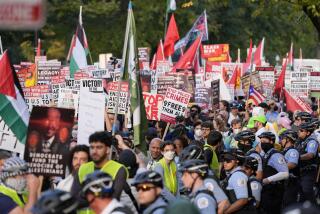Media Can’t Shake the Ghosts of Bloody ’68
- Share via
CHICAGO — If the Democrats are having a rollicking political party in the Windy City this week, the media have indulged in a flashback attack to the bloody days of real action news--the last Democratic convention here in 1968.
With 35,000 people meeting so peacefully that the official protest grounds have at times been all but empty, networks have turned to far more interesting film from 1968. Police officers wielding billy clubs, protesters chanting and bleeding. The media have suddenly offered something that is rare in the television news business--historical context.
All four major networks have rerun segments on Chicago’s ugly heritage. At CBS News, Dan Rather rebroadcast moments from his coverage 28 years ago, while “60 Minutes” reran an old interview with the city’s historic boss, Richard J. Daley. A panel on PBS during the convention has repeatedly talked about 1968, its meaning then, its meaning now.
“I saw some national research recently that said less than a third of the population had any substantial recollection of what happened here,” said David Axelrod, media consultant for Chicago Mayor Richard M. Daley, son of “hizzoner,” as Richard J. was sometimes called.
But reporters? Many came to Chicago this year like old war veterans who return to wander over the battlefields. They can almost conjure up the blood and the smell of tear gas from ’68.
“Virtually every national reporter seems to have a war story,” Axelrod said. “It’s almost a reunion in that regard.”
But if the newspapers are full of stories and the airwaves are full of grainy black-and-white footage of longhaired radicals training to do battle with police and of the violence that followed, all this distant anguish may not be bad for today’s Democrats.
The “retro-footage” makes today’s convention look vastly better by comparison, some Democratic activists have suggested. And that contrast--often one of the acceptable reasons to do a news story--has helped the Democratic National Committee in its mission to come out of Chicago with as much or more free publicity as the Republicans got from their convention earlier this month in San Diego.
Asked whether the contrast from Chicago 1968 to Chicago 1996 is working in his party’s favor, Daley grinned broadly this week and said, with customary understatement: “It’s fine.”
But the remembrances have cut two ways. When NBC-TV anchor Tom Brokaw suddenly asked Al Gore whether he was in Chicago’s Grant Park back then, the vice president suddenly stiffened.
“I was there in Grant Park, more as an observer,” Gore said awkwardly.
“But that’s like saying you didn’t inhale, practically” Brokaw responded.
Those who watched the interview suggested Gore looked so uncomfortable that they wondered whether it was the first time he had been asked about the event, which occurred when he was a young student at Harvard and was opposed to the war in which he later served as an Army officer.
But Gore’s awkwardness was fleeting and for the most part the past has worked well in the present. For Republican Party activists in Chicago monitoring their opposition, the way the Democrats have fared is somewhat irritating--given the divisions in the Democratic Party that are readily visible between the “new Democrat” moderates and the old-line liberals like California state Sen. Tom Hayden, a veteran of the ’68 battle who is one of the most frequently interviewed delegates on the floor of this convention.
Republicans are also somewhat irritated that the Democrats have managed to push the networks into expanding their “windows” of live coverage on separate nights this week by allowing actor Christopher Reeve and then keynote speaker Evan Bayh to stray past their appointed cutoffs.
“‘I’m sure they would have pulled the plug on us if we did that,” Republican Party communications director Ed Gillespie said of the networks.
This wash of good publicity for the Democrats seems true even though the Republicans say that they have had “‘a great deal” of access to various news organizations as part of their effort--dubbed “Chicago Bull”--to rebut statements by Democrats this week from the podium.
Republican Party Chairman Haley Barbour said after his daily press briefing Wednesday that he and his team of Republicans had appeared on more than 150 radio and television shows so far this week.
More to Read
Get the L.A. Times Politics newsletter
Deeply reported insights into legislation, politics and policy from Sacramento, Washington and beyond. In your inbox twice per week.
You may occasionally receive promotional content from the Los Angeles Times.









